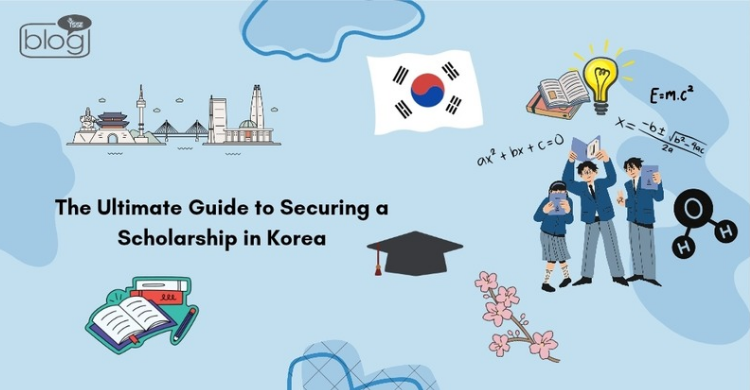Dreaming of Korea?
Your Creative Guide to Scholarships Awaits
Have you ever imagined considering South Korea? A nation known for its high-tech advancement, world-class colleges, and wealthy social legacy? What if you could make this dream a reality without stressing about educational costs or living expenses?
The great news is that South Korea offers a wide range of grants for worldwide students. Whether financed by the government, colleges, or private organizations, these grants give openings to ponder in an energetic scholastic environment while diminishing money-related burdens. But how do you discover the right grant, meet the qualification criteria, and yield a winning application? This direct will provide you with all the basic steps to effectively get a grant in Korea.
Why Select Korea for Higher Education?
- World-Class Instruction
Colleges like Seoul National College (SNU), KAIST, and Yonsei College reliably rank among the best in Asia and worldwide.
- Strong Investment & Career Prospects
Korea is a pioneer in innovation, trade, and development, offering amazing scholarly and work opportunities for students.
- Generous Grants
Numerous grants cover educational costs, convenience, and indeed month-to-month remittances, making instruction affordable.
- Cultural Encounter
Living in Korea permits you to encounter a special mix of convention and innovation, from verifiable locales to K-pop culture.
Beat Grants Accessible in Korea
When it comes to financial aid, international students usually have access to three key types of grants:
- Government Scholarships:
One of the most prestigious choices is the Worldwide Korea Grant (GKS) (once in the past known as KGSP). It covers:
- Full educational cost fees
- Monthly stipend (~KRW 1,000,000)
- Airfare and settlement allowance
- Medical protections and Korean
- Language training
- University Scholarships:
Most Korean colleges offer their students financial help based on justification or requirement. A few prevalent ones include:
- SNU Grant for Worldwide Students
- KAIST Universal Understudy Scholarship
- Yonsei Underwood Universal College (UIC) Scholarship
- Private and Corporate Scholarships:
Organizations like POSCO, Samsung, and Hyundai offer financing for students, particularly in STEM and commerce areas. These regularly come with internship openings, boosting career prospects.
Qualification Criteria for Korean Scholarships
- Academic Execution
A solid GPA (regularly 3.0 or higher) increases your chances.
- Dialect Capability
A few programs require TOEFL/IELTS for English or TOPIK for Korean.
- Nationality & Age Limits
Grants like GKS have age confinements (e.g., beneath 25 for undergrad, beneath 40 for graduate programs).
- Field of Ponder
A few grants prioritize STEM, commerce, or social sciences.
A Step-by-Step Guide to Applying for a Scholarship
- Step 1: Inquire about & Waitlist Scholarships
Visit official college websites and the Consider in Korea portal. Read qualification criteria and due dates carefully.
- Step 2: Prepare Essential Documents
Most scholarships require:
- Application Form (correctly filled out)
- Academic Transcripts & Certificates (translated if necessary)
- Personal Statement & Study Plan (highlighting your academic goals)
- Recommendation Letters (from professors or employers)
- Language Test Scores (TOPIK, IELTS, or TOEFL if required)
- Step 3: Submit Your Application
Some scholarships require direct application to universities. Others, like GKS, require submission through the Korean embassy. Double-check deadlines—late submissions are not accepted.
- Step 4: Get Ready for the Interview (If Applicable)
If shortlisted, you may need to attend an interview. Common questions include:
- Why do you want to study in Korea?
- In what ways will this scholarship help you achieve your career ambitions?
- What makes you a strong candidate?
Preparation on these matters will keep you ahead of other candidates.
How to Progress Your Chances of Winning a Scholarship
- Start in advance
Begin your scholarship search and preparation process at least half a year beforehand.
- Write a Compelling Individual Articulation
Clearly express your aspirations, accomplishments, and reasons for choosing Korea.
- Obtain solid recommendation letters
Ask for references from teachers or bosses who can highlight your strengths.
- Improve Your Korean Dialect Abilities
Indeed, a fundamental TOPIK (Level 2 or 3) score can boost your chances.
What to Do After Accepting a Scholarship?
- Confirm Your Acknowledgment
Follow the grant provider’s instructions.
- Apply for an Understudy Visa (D-2 Visa)
Yield your grant affirmation and college affirmation letter.
- Prepare for Life in Korea
Organize lodging, budget your costs, and learn fundamental Korean phrases.
Winning a grant to ponder in Korea requires exertion, but with legitimate arranging, it’s completely achievable. If you’re genuinely considering Korea, begin your inquiry nowadays and take the first step toward a life-changing scholarly travel!
So, are you ready to turn your dream into reality? Start preparing now!
To read more blogs like this, click here
Sidratul Montaha Tabita
Intern at Content Writing
YSSE

